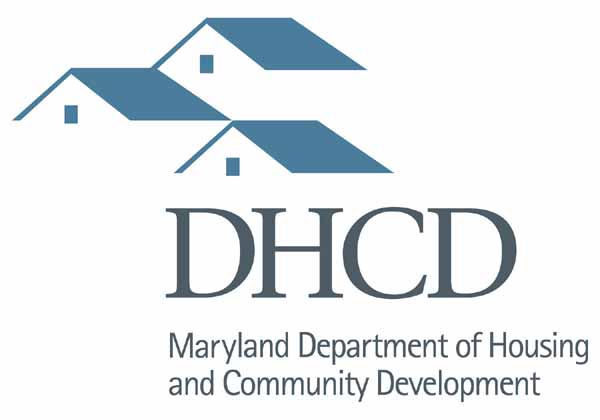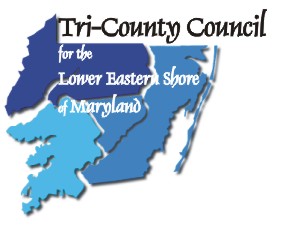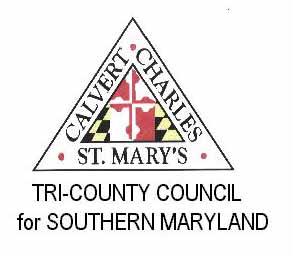The Rural Health Roundtable -- October 2008
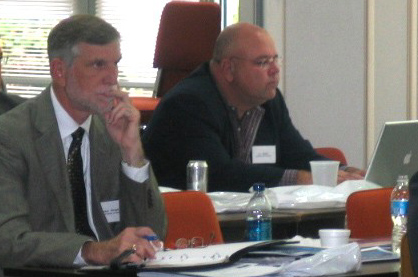 |
Maryland Delegate Peter Murphy (left) and Maryland Senator E.J. Pipkin (right)
attended the Rural Health Roundtable.
|
The Rural Maryland Council's Health Care Working Committee on January 15, 2009 approved
an Action Plan
that outlines the RMC's priorities and activities over the short term and the
long term. It is based on the information and discussions that took place during
the Roundtable (below). The RMC's Executive Board will vote on whether to adopt
the plan at its next full Board meeting on January 28, 2009
The Rural Roundtable Summary Report is an overview of the event and
the results of each of the break out sessions. This is provided for those agencies
and organizations who are interested in working on priorities to increase recruitment
and retention of health care workers in rural areas.
Roundtable Presentations
The Roundtable also offered an overview of Maryland's health care workforce
shortages. Posted below are the Powerpoints which were presented during the event.
Also, see the Roundtable agenda.
Thursday, October 2, 2008
Setting the Stage: The morning sessions were dedicated to providing
participants with a summary of the various task forces, studies and commissions
that have been studying health care work force shortages, especially as they
relate to rural areas.
- An Overview of Physician Workforce Shortages, presented by
Robert Barish, M.D., University of Maryland School of Medicine.
Dr. Barish discussed the results and reality of a
Physician Workforce Shortage Study recently completed by the
Maryland Hospital Association and Med Chi, the Maryland State Medical Association.
VIEW PRESENTATION.
- Implementing the Maryland Rural Health Plan, presented by
Michelle Clark, Program Director, State Office of Rural Health.
Ms. Clark provided an overview of the Maryland Rural Health Plan, which was
released in July 2007, and discussed the priorities identified in the plan,
especially the need to address workforce shortages and retention across all
health care specialities in rural areas. VIEW
PRESENTATION.
- An Overview of Nursing and Allied Health Shortages, presented by
Catherine M. Crowley, Ed.D., Vice President, Maryland
Hospital Association. Dr. Crowley provided an overview of the activities of the
Maryland Healthcare Workforce Shortage Committee and the Governor's Workforce
Investment Board. She also discussed nursing recruitment and retention initiatives
as well as the
Who Will Care? plan. VIEW PRESENTATION
- An Overview of State Initiatives and Programs, presented by Ben
Steffen, Maryland Health Care Commission. Mr. Steffen reviewed
the work of the Governor's Task Force on Health Care Access and Reimbursement
and the Maryland Health Care Commission on Health Information Technology.
VIEW PRESENTATION.
Luncheon Keynote: Task Force to Review Physician Shortages in Rural Areas,
presented by Senator Thomas "Mac" Middleton, who chairs the Task Force and introduced
the bill that created it. Senator Middleton discussed some
preliminary recommendations. Final recommendations will be completed in December 2008.
Grow Your Own: An Overview of How Other States Have Created a Pipeline of
Health Care Professionals.
- West Virginia: How to Grow Your Own Pipeline of Health Care Professionals, presented by
April Vestal, Associate Director, Site Liaison
for the West Virginia Rural Health Education Partnership.
VIEW PRESENTATION.
- Alabama's Grow Your Own pipeline, presented by
John R. Wheat, MD, MPH, Professor, College of Community and Health Sciences, Department of Community and Rural Medicine,
University of Alabama School of Medicine. VIEW
PRESENTATION. (Note: Most photos were removed from this presentation in order
to reduce file size and increase download time.)
Telehealth as a Solution to Connect Rural Maryland.
This session will highlighted pilot projects that connect urban medical specialists
to other areas and what it takes to expand and sustain telehealth within Maryland.
Presenters also discussed other pilot projects designed to ease rural
workforce shortages via telehealth solutions
- Maryland Stroke Telemedicine Project, presented by Barney J. Stern, MD
Department of Neurology, University of Maryland (with a presentation developed
inpartnerhsip with Eric Aldrich, M.D.,Assistant Professor of Neurology and
Physical Medicine & Rehabilitation, Johns Hopkins University and Chairman of the
Maryland Stroke Association. VIEW PRESENTATION.
- Telemental Health, presented by Brian Grady M.D.,
Director, Telemental Health, University of Maryland School of Medicine.
VIEW PRESENTATION
- Maryland e-Care, presented by Michael Franklin, President and CEO,
Atlantic General Hospital Corporation. VIEW
PRESENTATION
Friday, October 3: Developing An Action Plan
Opportunities for Implementing a Stronger Grow Your Own Model in Maryland.
This session identified what components of
a “Grow Your Own Models” are already working well in Maryland as well as some
of the gaps in the current healthcare workforce pipeline, presented by
Michelle Clark, State Office of Rural Health, and Susan Stewart, Western Maryland AHEC.
VIEW PRESENTATION.
Developing an Action Plan. Participants break into three Action Groups
to review and study a series of recommendations and determine which are the most
important to pursue over the short- and long-term. Break out groups studied Grow Your Own models,
Recruitment and Retention, and Telehealth Initiatives. The RMC's Final Report will
be presented to the RMC Board on October 21. Once approved, it will be posted here.
Major Sponsors
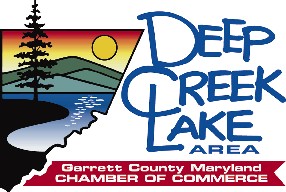
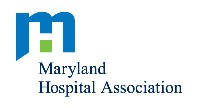

Sponsors
Roundtable Speaker Biographies
Eric Aldrich, M.D., Assistant Professor of Neurology and Physical Medicine &
Rehabilitation, Johns Hopkins Departments of Neurology and Neurosurgery.
Dr. Aldrich attended medical and graduate school at George Washington University
Medical Center, followed by a residency in neurology at The Johns Hopkins Hospital.
He received further fellowship training in neuro rehabilitation and stroke at UCLA
Medical Center, and subsequently became a member of the UCLA Stroke Center. He
returned to Johns Hopkins to help create and develop the stroke service, and
currently serves as its medical director. His current research interests include
acute stroke interventions, secondary stroke prevention and stroke health care
policy and medical economics.
Robert A. Barish, M.D, Vice Dean for Clinical Affairs, University of Maryland
School of Medicine. Dr. Barish received his medical degree from New York Medical
College and, after interning at Saint Vincent’s Hospital and Medical Center in New
York, he traveled to the border of Cambodia and Somalia to provide medical care
in refugee camps. He came to the Baltimore/Washington area to enter the
emergency medicine residency program sponsored by Georgetown University Medical
Center, George Washington University Medical Center and the Maryland Institute
for Emergency Medical Services Systems. Dr. Barish later served as the University
of Maryland’s Director of Emergency Medical Services and Chief of Emergency Medicine.
Michelle G. Clark, Project Director, State Office of Rural Health, Family
Health Administration, Maryland Department of Health and Mental Hygiene.
Michelle joined the State Office in 2007 after serving with the University of
Maryland School of Medicine where she worked on the state’s System of Care
Implementation within children’s mental health. She is a Licensed Graduate of
Social Work and has her Masters in Public Health.
Catherine M. Crowley, R.N., M.B.A., Ed.D., Vice President, Maryland Hospital
Association. Dr. Crowley works with hospitals, schools and government agencies
to develop strategies to recruit and retain health care workers. She is a leader
in several initiatives to expand the state’s capacity for nursing education. These
include development of Clinical Assignments for Healthcare Students, a Web-based
system for helping hospitals and schools communicate about student clinical
placements; Who Will Care? The Case for Doubling the Number of RNs Educated in
Maryland, and the Maryland team selected to participate in the national Nursing
Capacity Summit.
Brian Grady M.D., Director, Telemental Health, University of Maryland School
of Medicine. Dr Grady, a graduate of the U.S. Naval Academy, received his medical
degree from the Uniformed Services University in Bethesda. While in the Navy, he
established circuit riding and telemental health technologies to provide
psychiatric services to rural military clinics in Maryland, Virginia, Pennsylvania,
Maine and New Hampshire. After he retired in 2005, he became Clinical Director
for TeleBehavioral Health for the Sheppard Pratt Health System providing
telepsychiatry services to Worcester County. He joined the University of Maryland
in 2007 as Director of Telemental Health.
Annie Kronk, Ph.D. spent nearly two decades with the Johns Hopkins Institutions,
where she managed Hopkins’ government affairs program and served as its registered
lobbyist in Annapolis. Now retired, she occasionally teaches courses in politics
and policy, and regularly consults with higher education organizations and
others on educational and rural health policy issues. She served two terms on
the Rural Maryland Council Board and is the former Chair of the RMC Health Care
Working Committee. In 2005, she was awarded the Rural Volunteer of the Year Award
for her leadership and dedication on behalf of rural Maryland.
Senator Thomas McLain “Mac” Middleton – Elected to the Maryland Senate in
1995 from Charles County, Senator Middleton chairs the Senate Finance Committee
and the Task Force to Review Physician Shortages in Rural Areas, which was
created by a bill he introduced in 2008. He is also a member of the Task Force
on Health Care Access and Reimbursement. Prior to being elected to the Senate,
he served as president of the Charles County Commission. Senator Middleton is
the owner and operator of Cedar Hill Farm near Waldorf and sits on the Board of
Trustees of Civista Medical Center. He was awarded the Outstanding Rural
Legislator Award from the Rural Maryland Council in 2000.
Charlie Ross, Chairman, Rural Maryland Council; and CEO/President, Garrett
County Chamber of Commerce. Mr. Ross worked for 25 years as a government
and public affairs consultant for a variety of clients with his expertise in
legal strategies, public affairs and advertising, and survey research. He
returned to his native Garrett County in 2002 as President/CEO of the Garrett
County Chamber which represents about 750 members in a County with a population
of 30,000.
Susan Stewart, Executive Director, Western Maryland Area Health Education
Center. Ms. Stewart oversees a variety of programs geared toward the recruitment,
retention, and continuing education of health professionals in underserved and
Health Professional Shortage Areas. She is a working committee member of the
Maryland Rural Health Plan Steering Committee, the Home Care and Hospice
Professional Advisory Committee of the Western Maryland Health System Joint
Hospital Board of Directors, and the Allegany County Access to Care workgroup.
April L. Vestal, MPH, Associate Director, West Virginia Rural Health Education
Partnerships Program. The WVRHEP is a statewide initiative that trains health
profession students from West Virginia University, Marshall University and the
West Virginia School of Osteopathic Medicine. This program places health
profession students in rural underserved communities for a portion of their
training and serves 54 of 55 counties. Ms. Vestal served as Site Coordinator
in the program for 8 years and for the last nine years has served as the
Associate Director. She holds a Bachelor of Science degree in Organizational
Management and Development from Bluefield College and a Masters of Public Health
from West Virginia University.
John R. Wheat, M.D., M.P.H, Professor, College of Community and Health Sciences,
Department of Community and Rural Medicine, University of Alabama School of
Medicine. Dr. Wheat oversees the Rural Health Scholars Program, Minority Rural
Health Pipeline Program and the Rural Medical Scholars Program and teaches
Rural/Community Medicine in year 3 of medical school. Dr. Wheat’s academic
interests revolve around vulnerable and underserved rural populations, e.g.,
prevention in agricultural medicine, insurance and health care systems for
uninsured rural children, and educational and community developments needed for
rural practice. He was named the 2007 Distinguished Educator of the Year by
National Rural Health Association.
Rural Maryland Council :: 50 Harry S. Truman Parkway :: Annapolis, MD 21401 :: 410-841-5772












